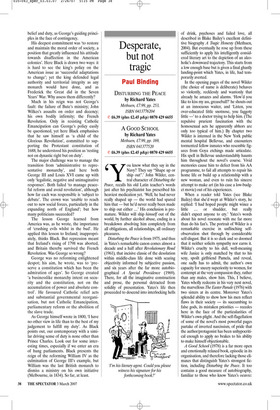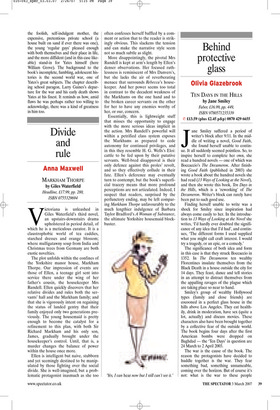Desperate, but not tragic
Paul Binding
DISTURBING THE PEACE by Richard Yates Methuen, £7.99, pp. 253, ISBN 0413776204 0 £6.39 (plus £2.45 p&p) 0870 429 6655 A GOOD SCHOOL by Richard Yates Methuen, £7.99, pp. 169, ISBN 041377520 0 £6.39 (plus £2.45 p&p) 0870 429 6655 ‘You know what they say in the Navy? They say “Shape up or ship out”.’ John Wilder, central character of Disturbing the Peace, recalls his old Latin teacher’s words just after his psychiatrist has prescribed his heaviest medication yet. ‘Well, he had never really shaped up — the world had spared him that — but he’d never really been made to ship out either ...’ His conclusion is premature. Wilder will ship himself out of the world, by further alcohol abuse, ending in a breakdown absolving him completely from all obligations, all relationships, all ordinary pleasures.
Disturbing the Peace is from 1975, and thus in Yates’s remarkable canon comes almost a decade and a half after Revolutionary Road (1961), that incisive classic of the desolation within middle-class life done with searing objectivity informed by subjective passion, and six years after the far more autobiographical A Special Providence (1969). There, for all the imaginative construction and prose, the personal detracted from solidity of presentation. Yates’s life then proceeded to descend into interlocking hells of drink, psychoses and failed love, all described in Blake Bailey’s excellent definitive biography A Tragic Honesty (Methuen, 2004). But eventually he rose up from these sufficiently to apply his intelligently considered literary art to the depiction of an alcoholic’s downward trajectory. This starts from a low enough base but is given a final ghastly landing-point which Yates, in life, had temporarily averted.
In the opening pages of the novel Wilder (the choice of name is deliberate) behaves so violently, recklessly and wantonly that already he amazes and alarms. ‘How’d you like to kiss my ass, greaseball?’ he shouts out at an innocuous waiter, and ‘Listen, you over-educated little snotnose, you faggoty little —’ to a doctor trying to help him. (The repulsive prurient fascination with the homosexual acts he apparently abhors are only too typical of him.) By chapter two Wilder is interned in the New York public mental hospital Bellevue, and encounters tormented fellow inmates who resemble figures from Goya etchings made articulate. His spell in Bellevue understandably haunts him throughout the novel’s course. Vivid memories cause him to defect from his AA programme, to fail all attempts to repair his home life or build up a relationship with a new woman, and even to ruin his sincere attempt to make art (in his case a low-budget movie) out of his experiences.
When a reader told Yates (see Blake Bailey) that she’d wept at Wilder’s story, he replied: ‘I had hoped people might wince a little ... or shudder, but really didn’t expect anyone to cry.’ Yates’s words about his novel resonate with me far more than do his fan’s. The portrait of Wilder is a remarkable exercise in unflinching selfobservation shot through by considerable self-disgust. But it is so dark and so doomed that it neither solicits sympathy nor earns it. Wilder’s cruelty to his dull, well-meaning wife Janice is only matched by that to his sexy, spoilt girlfriend Pamela, and reveal, one sadly has to admit, the author’s own capacity for sneery superiority to women, for contempt at the very compassion they, rather than any males, show him. This, I believe, Yates wholly redeems in his very next novel, the marvellous The Easter Parade (1976) with two sisters at its centre. Moreover Yates’s splendid ability to show how his men reflect flaws in their society — its succumbing to false gods, its mistaken priorities — recedes here in the face of the particularities of Wilder’s own plight. And the self-flagellation of some of the novel’s most powerful pages partake of inverted narcissism, of pride that the author/protagonist has been unhypocritical enough to apply no brakes to his ability to make himself objectionable.
A Good School (1978) is a far more open and emotionally relaxed book, episodic in its organisation, and therefore lacking those climaxes that distinguish Yates’s strongest fiction, including Disturbing the Peace. It too contains a good measure of autobiography, familiar to those who know Yates’s oeuvre: the foolish, self-indulgent mother, the expensive, pretentious private school (a house built on sand if ever there was one), the young ‘regular guys’ pleased enough with both themselves and their place in life, and the more diffident (and in this case likeable) stand-in for Yates himself (here William Grove). The background to the book’s incomplete, fumbling, adolescent histories is the second world war, one of Yates’s great subjects. The chapter describing school paragon, Larry Gaines’s departure for the war and his early death shows Yates at his finest. It reminds us how, amid flaws he was perhaps rather too willing to acknowledge, there was a kind of greatness in him too.











































































 Previous page
Previous page